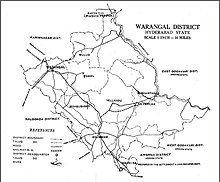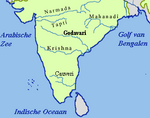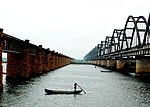District of Telangana in India
| Khammam district | |
|---|---|
| District of Telangana | |
 Erradibba Stupa in Nelakondapalli Erradibba Stupa in Nelakondapalli Khammam Fort view Khammam Fort view Mukkanteswaralayam in Kusumanchi Mukkanteswaralayam in Kusumanchi | |
 Location in Telangana Location in Telangana | |
| Khammam district | |
| Country | India |
| State | Telangana |
| Headquarters | Khammam |
| Mandalas | 21 |
| Government | |
| • District collector | Sri V.P.Gautham I.A.S., |
| • Parliament constituencies | 1 |
| • Assembly constituencies | 10 |
| Area | |
| • Total | 4,361 km (1,684 sq mi) |
| Population | |
| • Total | 1,401,639 |
| • Density | 320/km (830/sq mi) |
| • Urban | 316,828 |
| Time zone | UTC+05:30 (IST) |
| Vehicle registration | TG 04 |
| Website | khammam |
Khammam district is a district in the eastern region of the Indian state of Telangana. The city of Khammam is the district headquarters. The district shares boundaries with Suryapet, Mahabubabad, Bhadradri districts and with Eluru and NTR districts.
History
Paleolithic man probably roamed around the areas of lower Godavari valley and the surroundings of Wyra, Sathupalli Taluks in the district. Prehistoric rock paintings were found near Neeladri konda near Lankapalli of Sathupalli Taluk.
Megalithic site on the campus of Government Degree college in Khammam has yielded pottery and skeletal remains. Kistapuram of the district were rich in Megalithic cultural remnants explored and discovered.
The southern parts of Khammam district flourished as famous Buddhist centers along with Amaravathi and Vijayapuri along the rivulets Munneru, Wyra and Murredu. Important Buddhist sites in the district are Nelakondapalli and Mudigonda
Post Independence
Khammam town which was the seat of Taluk Administration was a part of the larger Warangal district, till 1 October 1953. Six taluks of the Warangal district viz., Khammam, Madhira, Yellandu, Paloncha, Kothagudem and Burgampadu were carved out as a new district with Khammam as headquarters. On 1 November 1956, Hyderabad state was dissolved, and Khammam district became part of Andhra Pradesh.
In 1959, Bhadrachalam revenue division consisting of Bhadrachalam and Nuguru Venkatapuram Taluks of East Godavari district, which were on the other side of the river Godavari were merged into Khammam on grounds of geographical contiguity and administrative viability. Aswaraopeta was also part of West Godavari District up to 1959. In 1973 a new taluk with Sathupalli as headquarters was carved out from Madhira and Kothagudem taluks. In the year 1976 three new taluks were formed viz., Tirumalayapalem, Aswaraopeta and Manuguru by bifurcating Khammam, Kothagudem and Burgampadu taluks respectively.
In the year 1985, following the introduction of the mandal system, the district has been divided into 46 mandals, under four Revenue Divisions – Khammam, Kothagudem, Paloncha and Bhadrachalam.
On 2 June 2014, Khammam together with nine other districts became the new state of Telangana, which was separated from Andhra Pradesh. On 11 July 2014, the Lok Sabha approved a bill transferring seven mandals of Khammam district (Kukunoor, Velairpadu, Bhurgampadu, Chintoor, Kunavaram, Vararamachandrapuram and Bhadrachalam) back to Andhra Pradesh, in order to facilitate the Polavaram Irrigation project.
Geography
Khammam district occupies an area of 4,361 square kilometres (1,684 sq mi). It is surrounded by Suryapet district and Mahabubabad district to the west, Bhadradri Kothagudem district to the east, NTR district to the south and east, and Eluru district to the east.
Demographics
| Religion in Khammam district (2011) | ||||
|---|---|---|---|---|
| Hinduism | 92.29% | |||
| Islam | 6.49% | |||
| Christianity | 0.98% | |||
| Other or not stated | 0.24% | |||
As of 2011 Census of India, the district has a population of 1,401,639. Mahabubabad has a sex ratio of 1005 females per 1000 males and a literacy rate of 65.95%. 139,614 (9.96%) were under 6 years of age. 316,828 (22.60%) lived in urban areas. Scheduled Castes and Scheduled Tribes made up 279,319 (19.93%) and 199,342 (14.22%) of the population respectively.
At the time of the 2011 census, 83.09% of the population spoke Telugu, 10.21% Lambadi and 5.54% Urdu as their first language.
Administrative divisions

The district has two revenue divisions of Kallur and Khammam. These are sub-divided into 21 mandals. V.P. Gautham is the present collector of the district.
Mandals

The mandals of Chinturu, Kunavaram, Nellipaka and Vararamachandrapuram were added to East Godavari district based on Polavaram ordinance.
The list of 21 mandals in Khammam district under 2 revenue divisions are:
Politics
Khammam district comprises 5 Assembly constituencies and 1 Lok Sabha constituency.
| Constituency number | Name | Reserved for | Parliament |
|---|---|---|---|
| 112 | Khammam | None | Khammam |
| 113 | Palair | None | |
| 114 | Madhira | SC | |
| 115 | Wyra | ST | |
| 116 | Sathupalli | SC |
Economy
In 2006 the Indian government named Khammam one of the country's 250 most backward districts (out of a total of 640). It is one of the districts in Telangana currently receiving funds from the Backward Regions Grant Fund Programme (BRGF).
Notable personalities
| This section includes a list of references, related reading, or external links, but its sources remain unclear because it lacks inline citations. Please help improve this section by introducing more precise citations. (February 2020) (Learn how and when to remove this message) |
- The former Chief Minister of Andhra Pradesh(United), Jalagam Vengala Rao is from Khammam District. He served as 5th chief minister during 1973–78.
- Thummala Nageshwar Rao, minister for Roads and buildings, women and child welfare in Telangana State Government is from this region. He also occupied several ministerial portfolios in United Andhra Pradesh.
- Ponguleti Srinivas Reddy is an Indian Politician, represented Khammam Lok Sabha Constituency (2014–2019). In 2023, Mr Reddy elected from Palair Assembly Constituency. Currently serving as Cabinet Minister in Government of Telangana.
- Renuka Choudary, is an Indian politician and a member of the Indian National Congress, She has also served as the Union minister of State (Independent Charge) for Ministry of Women and Child Development and Tourism in United Andhra Pradesh in the Government of India.
- Nama Nageswara Rao served as Member of Parliament for 16th Lok Sabha of India. He is a businessman and owner of Madhucon Projects.At present 2020 he is the minister of Khammam district (TRS Party).
- Babu Mohan, notable actor and comedian in the Telugu film industry. He also served as Social Welfare Minister in TDP Government.
- Vandemataram Srinivas is a South Indian music director, actor and singer.
- K.Dasaradh is a Telugu film Writer, Director. He is well known for his movies Santosham (2002 film) and Mr. Perfect (film).
- Srinivasa Reddy, notable actor and comedian in the Telugu film industry.
References
- "Vehicle Registration Codes For New Districts In Telangana". sakshipost.com.
- Paleolithic History of Godavari valley. 1984.
- Murty, M. L. K. (2003). Comprehensive History and Culture of Andhra Pradesh: Pre- and protohistoric ... ISBN 9788125024750.
- Sridhar, P (4 June 2012). "Excavation throws light on burial practices of megalithic age". The Hindu. Chennai, India.
- Sridhar, P. (22 February 2012). "Three megalithic sites discovered". The Hindu. Chennai, India.
- "The Andhra Pradesh Reorganisation (Amendment) Bill, 2014" Accessed 13 July 2014
- "Protests against Centre, Andhra Pradesh in Khammam over Polavaram Bill". Deccan Chronicle, 12 July 2014. Accessed 13 July 2014.
- ^ "New districts". Andhra Jyothy.com. 8 October 2016. Archived from the original on 25 December 2018. Retrieved 8 October 2016.
- "Population by Religion - Andhra Pradesh". Census of India. Registrar General and Census Commissioner of India. 2011.
- "Know your district Plan your district - Khammam" (PDF). trac.telangana.gov.in. Telangana State Remote Sensing Applications Centre.
- "Table C-16 Population by Mother Tongue: Andhra Pradesh". Census of India. Registrar General and Census Commissioner of India.
- "Administrative Map of Khammam District". Khammam District. Retrieved 21 December 2017.
- "Ordinance on Polavaram project promulgated". The Hans India. Hyderabad. 29 May 2014. Retrieved 12 November 2015.
- ^ Ministry of Panchayati Raj (8 September 2009). "A Note on the Backward Regions Grant Fund Programme" (PDF). National Institute of Rural Development. Archived from the original (PDF) on 5 April 2012. Retrieved 27 September 2011.
External links
| Places adjacent to Khammam district | |
|---|---|
| Godavari basin | |||||||||||||||
|---|---|---|---|---|---|---|---|---|---|---|---|---|---|---|---|
| Rivers |
|     | |||||||||||||
| Dams, barrages |
| ||||||||||||||
| Geographical features / regions | |||||||||||||||
| Riparian districts |
| ||||||||||||||
| Cities | |||||||||||||||
| Languages / people | |||||||||||||||
| Coalfields | |||||||||||||||
| Oil / gas fields | |||||||||||||||
| Industries |
| ||||||||||||||
| Transport |
| ||||||||||||||
| Pollution concerns, river basin's sustainable productivity & ecology |
| ||||||||||||||
| Related topics | |||||||||||||||
| Other basins | |||||||||||||||